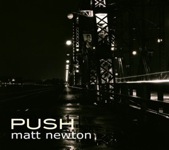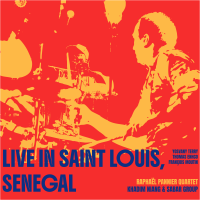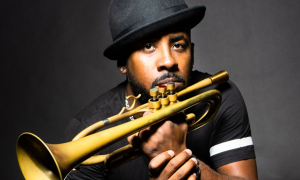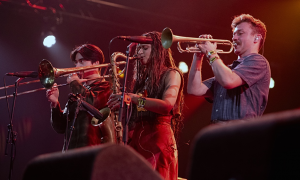Home » Jazz Articles » Live Review » Vision Festival 2009: Day 2
Vision Festival 2009: Day 2
All-Star Collective / Bill Cole's Untempered Ensemble / Sun Ra Arkestra
14th Annual Vision Festival
Abrons Arts Center
New York, New York
June 10, 2009
Continuing a tradition by which the Vision Festival celebrates the lifetime's achievement of one of the avant jazz communities elders, June 10 was Marshall Allen day, following in the wake of previous celebrations which have honored Fred Anderson, Sam Rivers, Bill Dixon and Kidd Jordan. So the impish 85-year-old Allen was the focal point of two of the evening's sets, bookending a third featuring a piece written especially in his honor. It certainly captured the public's imagination with a full house and people turned away at the doors.
As a member of the Sun Ra Arkestra for more than 50 years, and its director since 1995, multi-reed player Marshall Allen has left an indelible stamp on The Sun Ra Arkestra's body of work, and thus the entire universe of improvised music. In special appearances outside of the Arkestra's fold, Allen's collaborators are as diverse as pianist Paul Bley, percussionist Babatunde Olatunji, Alan Silva, John Medeski, Kidd Jordan and Henry Grimes.
Following his discharge from the army in 1949, Allen studied clarinet at the Paris Conservatory of Music with Jacques Delecluse. In 1952, Allen settled in Chicago where he began writing music and leading his own small groups. After checking out an early Sun Ra demo, Allen sought them out, and joined the band in 1958, beguiled by Sun Ra's music though initially bewildered by his philosophy. Allen has remained with the Arkestra ever since, first presiding over the saxophone section with John Gilmore, and in 1995, taking over as director. Allen still lives in the Philadelphia home the members of the Arkestra have shared since 1968, encouraging the same sense of community that Ra had fostered.

For the first set of the evening Allen was part of a quintet featuring legendary New Orleans tenor saxophonist Kidd Jordan (pictured left, with William Parker), in a lineup revisiting the celebrated All Star Game (Eremite, 2003) except for the substitution of bassist Henry Grimes in place of Alan Silva's eldritch bowing. Though billed as a collective, Allen loosely orchestrated the two ensuing improvisations in a free flowing 40—minute set.
Starting on his Electronic Valve Instrument (EVI), Allen's spacey warbles were answered by Grimes' stream of consciousness plucking, before a querulous whistle on the EVI summoned Jordan to the fray, and then William Parker's arco drone in a incremental opening to the set. It wasn't long before Jordan and Allen were intertwined in daredevil aerobatics buoyed by Parker's muscular propulsion and Hamid Drake's ever-changing pulse. Breaking away, Jordan spiced his middle register assertions with falsetto whinnies, with Allen backing him with encouraging long tones. Jordan even worked in a Trane quote into his narrative, at one stage paying homage to one of his prime touchstones.
If ever any sales pitch was needed for the healing, rejuvenating power of music then Allen was it: he looked like he could go on forever, though wisely he paced himself, avoiding any extended outpourings, in the light of what was to come. As ever his distinctive alto saxophone stylings, with his right hand fluttering across the saxophone keys, made a viable concoction from multiphonics, overblowing and barking cries. At one point he hunched his shoulders to trade yelps with Jordan, before locking into a staggered rhythm, instantly echoed by the responsive Drake. Unlike his usual tandem stints with Parker on bass, the drummer tonight kept more of an abstract pulse, mediating between the twin poles of Parker and Grimes, who had a free agent role. A good move as it meant the older man could go where his open ended wanderings took him, on violin as well as bass, without worrying about anchoring the quintet.
After the thirty minute opener a shorter chaser began with a delicate cymbal pulse from Drake and a pleasing combination of electronic mini keyboard twiddling from Allen and scrabbling violin from Grimes, which presaged more time playing from the drummer and walking accompaniment from Parker. Allen pitched in with a blues riff, eventually leading to a titanic solo from Jordan, testifying over twin arco basses, his knees bent and back arched as he squealed to a crescendo in one of the highpoints of the set. Five-part mayhem ensued before Allen signaled a halt with an upward whistle on his EVI.
Bill Cole's Untempered Ensemble
Though no stranger to the Vision Festival, Bill Coleman's Untempered Ensemble was nonetheless a very pleasant surprise. One of the joys of festivals is coming across unfamiliar acts. Without preconceptions you can enjoy the performance for what it is—not what you thought it should be. As the name suggests, Cole specializes in instruments not confined to the tempered sonorities of western music, reveling in the microtonal world of Asian double reeds, and also this evening the didgeridoo, which was where he started his set with a deep buzzing drone. Cole, a composer, author and educator who was professor of music at Dartmouth College until his retirement, has a resume to die for including performance with Ornette Coleman, Sam Rivers, Julius Hemphill and James Blood Ulmer.

Accompanying Cole's drone (shown on right) was a subtle unison of voice, from his daughter Althea Sully Cole, Joseph Daley's burnished tuba, and bass from upcoming talent Shayna Dulberger, which evolved into a pleasing groove. Titled "A Man of Outstanding Qualities Pre-eminent Among His Comrades," this first very rhythmic piece was especially written for the evening and dedicated to Marshall Allen. Justifying Cole's introduction as a master blaster, drummer and percussionist Warren Smith showed delightful timbral control and organization, as well as maintaining an effortless forward motion, aided by Atticus Cole's conga punctuations. After a double reed solo mimicking the inflections of the human voice, came a tandem spot for Daley and Dulberger, exposing the constantly probing activity beneath the serene surface of the music. At the unison theme restatement, Cole interjected vocal yelps, before the piece gradually wound down.
Neat arrangements and fine group interaction characterized the three pieces of their 50-minute set. Partway through the sprightly "Poverty Is The Father of Fear," Sully Cole and Daley, this time on euphonium, delivered a stunningly powerful incantation of the title, over Dulberger's riffing and Smith's freer pulse. This led to a Daley solo over the shifting rhythmic carpet, flexing his knees at the height of the intensity while the rest of the band riffed behind his euphonious wails. Dulberger made the most of her role. Boasting a big sound, and assuredly handling the grooves, she was even better when give opportunity to extemporize, very fast but sure-fingered with no loss of articulation and possessing a great rhythmic attack. A great set from a very focused band.

With a stage crammed full of gaudy costume, sheaves of scores and musical instruments, the expanded 19 piece Arkestra was a thing of splendor to behold. After a freeform opening take off, they played a long set of solid big band swing, very tight, almost slick in fact, with an infectious mix of Ra classics, Allen originals, standards and space chants which was a great hit with the sell out audience. At the front left of the stage Allen was a whirl of red cape and gold saxophone, belaboring his alto with one hand while gesticulating wildly at the assembled ranks with the other, cueing solos, calling charts and guiding transitions. While some happened in the moment, like the segue from the opening free maelstrom into Ra's swinging "Dreams Come True" with the Arkestra clapping and swaying in time, others appeared prearranged with a series of soloists stacked on each other's heels.
Allen is a unique stylist and was the most adventurous of the soloists, bursting into an overblown squeal with feet planted wide apart and almost squatting in his need to expel energy. But it was a close run thing with some fiery trumpet cameos from Michael Ray and Fred Adams also catching the ear. Guest Billy Bang had a fine feature in duet with Allen's sweet-sour alto on one of the few ballads. Having avoided keyboards for obvious reasons, the Arkestra now has the exciting Farid Barron in the piano chair, contributing wild introductions, excellent comping and bluesy organ. His ragtime piano ushered in a delightful reading of "Way Down Yonder in New Orleans," complete with wah wah trumpet and band vocals and Dixieland feel, all taken very straight without a hint of kitsch.

Marshall Allen with Art Jenkins
Percussion and a darkly funky riff introduced a lilting "In-B-Tween," with Danny Ray Thompson forsaking his baritone for flute to join Allen's alto, inspiring altoist Knoel Scott to come forward with some wonderfully acrobatic forward rolls, emptying his pockets of small change as he did so. A series of loosely overlapping solos was curtailed by shrill piercing cries from Allen's EVI signaling the familiar chant of "Interplanetary Music." It was time for some of the classics now as "Fate In A Pleasant Mood" gave way to "We Travel The Spaceways" with band members parading round the stage, throwing in space hops as they collected their instruments and dismounted the stage to a standing ovation.
As attempts were made to convene musicians from both the band and the audience for a group photograph, Allen freaked out on EVI summoning the Arkestra to rejoin for some exuberant reefer music with "Hit That Jive Jack." I've no idea if they ever managed to assemble for the photograph. Still jet-lagged I left at that point, with the Arkestra threatening another 90 minutes at least, and their joyful noise ringing in my ears.
To come the following evening was a fascinating bill promising multimedia performances from drummer William Hooker and poet David Budbill, and a rare NYC appearance from percussion legend Sunny Murray.
Photo credit
John Sharpe
Tags
PREVIOUS / NEXT
Support All About Jazz
 All About Jazz has been a pillar of jazz since 1995, championing it as an art form and, more importantly, supporting the musicians who make it. Our enduring commitment has made "AAJ" one of the most culturally important websites of its kind, read by hundreds of thousands of fans, musicians and industry figures every month.
All About Jazz has been a pillar of jazz since 1995, championing it as an art form and, more importantly, supporting the musicians who make it. Our enduring commitment has made "AAJ" one of the most culturally important websites of its kind, read by hundreds of thousands of fans, musicians and industry figures every month.






















